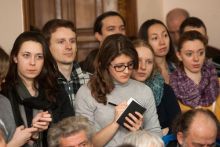Members of the “December 1” Initiative Group Yevhen Sverstiuk and Viacheslav Briukhovetsky met with the students of Kyiv Mohyla Academy. Issues on the agenda are the choice of values and revolution of consciousness.
Danylo Lubkivsky, Adviser to the President in 2006-10, who was invited to the meeting, referring to an American publicist, said that the future belongs to those who, in addition to high IQ, have high rates of passionarity and interest. However, according to Lubkivsky, currently the Ukrainian society is immature, depressing, and compromising. He believes that the situation might change if the traditional Russian questions: “Who is to blame?” and “What should be done?” would be set aside and, instead, another issue will be raised: How should we live? This will be a revolution of consciousness.
The reason for people’s passiveness, according to the writer, political prisoner of the Soviet regime Yevhen Sverstiuk, lies in the fact that the course of the 20th century was built on negative principles, which excluded normal course of life: constraint, force, control, and hatred. “We need to implement positive principles, which could become the basis for people’s self-development and their search for place in life,” stated Sverstiuk. The Initiative Group suggested the list of items on which a person can rely in his self-improvement and transformations in the society and the state in the “Charter of a Free Man” in late 2012.
Besides, according to the dissident, the inherited tradition to wait for someone to point the way and technologization of communication process that results in atomization of society have negative impact on the passionarity of the modern society. Literary critic and honorary president of the National University Kyiv Mohyla Academy Viacheslav Briukhovetsky agreed with this statement. According to him, the obstacle on the path of the development of civil society is the inability of people to maintain horizontal links. The fact that after the Orange Revolution the socially active people lost contact can serve as an illustration to this.
“Before uniting against someone, you need to decide among yourselves, what will be the basis for such union,” said the journalist, translator, and expert on constitutional and European law Hennadii Druzenko. He stressed that the Initiative Group gives an impulse to act for the society. Druzenko believes that not everyone will be able to fulfill all the norms suggested in the “Charter” – the bar is rather high. But even if ten percent of people would follow these principles, would be united, and would pursue an active position, they can determine the discourse of the state as a whole.
Most of the values suggested by the “December 1” Initiative Group, as defined by the authors, are pro-Western. In this context, Briukhovetsky imposes considerable hope for the younger generation: “Young people already live and act in accordance with European values, for them European integration is not an issue,” he stressed.
According to Druzenko, in the broad sense Ukrainian people are a European nation. “We, for example, are more European than Greeks but, at the same time, we are way far from the British or German people,” he noted. “Ukraine is radically different in that we don’t have the European elite capable of thinking strategically. We also lack the European ability to find compromise while staying different and not only to cohabit, but also to be a competitive project in the global world,” added the expert.
“Change of consciousness, departure from the old values, habits, and stereotypes happens all the time,” Sverstiuk is convinced. “The only question is when it would reach its critical point.”







